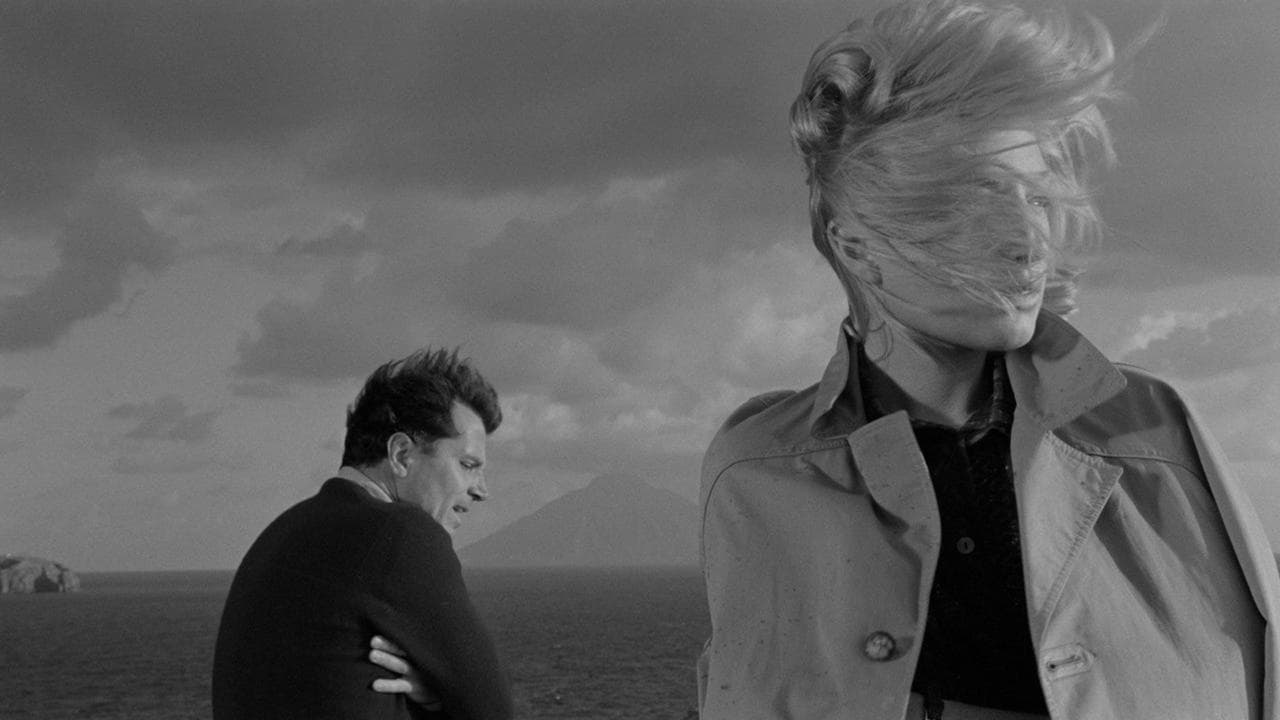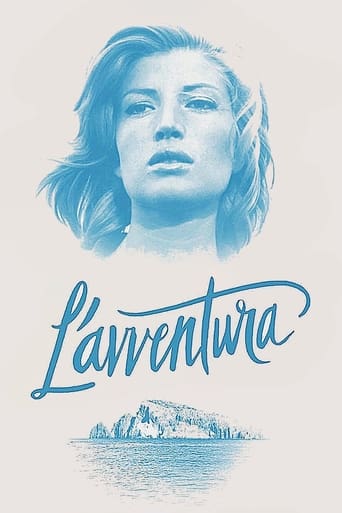

It's a mild crowd pleaser for people who are exhausted by blockbusters.
... View MoreThis movie was so-so. It had it's moments, but wasn't the greatest.
... View MoreThis is a must-see and one of the best documentaries - and films - of this year.
... View MoreIt's the kind of movie you'll want to see a second time with someone who hasn't seen it yet, to remember what it was like to watch it for the first time.
... View MoreThis is my third Antonioni film after deserto rosso and Zabriskie point. As I was fascinated with the first two, I opted to go for another one.It was mostly the unconventional plot, which especially attracted me to l'avventura. One of the main protagonists disappearing mysteriously quite at the beginning, a fact that later on in the movie is almost forgotten and never resolved, this was so unusual that I really had to see this one. Considering this, I was of course in a completely different situation than the first nighters, who did not have this information and hence probably were waiting for the whole rest of the film for the riddle to be resolved. As their expectations were not met, the film apparently was being barracked at its premiere.My expectations, however, still were a bit discharged, because the lost person is not as much forgotten in the movie as most movie comments suggest. After the disappearance, there can always be felt a certain indisposition among the new lovers. Due to this fact, the film to me is not so negative since after all, people in the movie still have their qualms whether it is right to forget so soon There is, of course, a certain decadency in the life style of the boat trip society, but a life in riches usually gives this impression to the ones, who do not have the luxury of being idle from financial sorrows. Moreover, the lush environments in Sicily (beautifully captured by Mr. Antonioni's long takes) also contribute to this impression and to the mindset of enjoying life.What was it then what Mr. Antonioni motivated for this kind of movie? This can only be a guess but I think that Mr. Antonioni was mostly interested in showing that moral values not necessarily hold if people are exposed to emotional excitement in stress situations, especially with the growing importance of individualism. Confusion and opportunity make the thief, so to say. Probably he also wanted to show how unimportant each of us becomes once he has left the scenery, as life always needs to go on. This may not be a pleasant thought but it cannot really be denied.Moreover, the flawless performances by Gabriele Ferzetti and a fascinating Monica Vitti alongside with the beauty of its camera work make this movie overall to a gem, that has to be recommended to all those who are looking for a movie that, for its loose ends, probably would no longer be produced nowadays.
... View MoreBy the time Michelangelo Antonioni released "L'avventura" a lot of important and revolutionary European films were being released such as "Pickpocket" by Robert Bresson, "The 400 Blows" by François Truffaut, "Hiroshima Mon Amour" by Alain Resnais, "Breathless" by Jean-Luc Godard and "La Dolce Vita" by Federico Fellini, and "L'avventura" certainly deserves a high spot between those revolutionary European film. The film tells the story of Anna(Lea Massari)a young woman who can no longer endure her meaningless bourgeoisie life and simply fades away without trace, then a discouraged search starts to find her but it only leads to nothing, except an doomed relationship between Anna's best friend Claudia(Monica Vitti)and Sandro(Gabriele Ferzetti) her fiancé. One of the main things that can be said about the film is the beautiful images Antonioni creates, from the island to the last scene, and besides being visually stunning, they show in a way the great abyss that there is between those characters, we not just see it but we can feel that abyss or void (which can also be experienced in Antonioni's incredible, haunting and enigmatic L'eclisse). In contrast to the beautifully composed shots we have the 'ugly' part of the film, the characters, mostly arrogant, selfish,alienated and people only living to create a distorted image of them to others, the only character that doesn't seem to fit this description is Claudia (Monica Vitti), the only seeming character that doesn't want to forget Anna, who seeks for something deeper, not just sex, but in contrast there is Sandro, a futile architect seeking only for sexual pleasure, her new 'romantic' affair. And one of the main reasons why'L'avventura' stills such a fascinating, innovative and fresh film is that people still act like Claudia's 'friends', only seeking out for sexual pleasure, for futile things. Love in modern bourgeoisie society doesn't exist any longer, only an 'sex drive' that for those like Claudia will only find disappointment and heartbreak, as it is shown in the hauntingly beautiful and moving last shots of the film.
... View MoreL'AVVENTURA was director Michaelangelo Antonioni's first international hit, winning the Special Jury Prize at the 1960 Cannes Film Festival. Here a small group of rich Italian socialites takes a boat out to a volcanic island. Anna (Lea Massari) quarrels with her fiancée Sandro (Gabriele Ferzetti), and subsequently goes missing. The police are brought in and divers scour the waters, but Anna never turns up. One would expect the film to develop as a whodunit, either revealing Anna to still be alive or putting the finger on the person responsible for her disappearance.Instead, Anna never shows up, and the film goes off in a rather different direction. Anna's friend Claudia (Monica Vitti) is suddenly promoted from a background character to the very centre of the picture, with her interaction with Sandro driving the action. While the film lacks a traditional plot, and indoor scenes tend to be brief arguments between lovers, the main part of the film is held together with a series of long shots of landscapes. Appreciating Antonioni's style requires some work, but as in the lengthy late works of composers Morton Feldman or Toru Takemitsu, eventually the rewards come. The scenes of the ocean while the party is on the volcanic island are beautifully constructed and will have stayed with me after the film ends. Furthermore, becoming comfortable with L'AVVENTURA makes one all the more ready for Antonioni's later films, which further develop this theme of human beings unable to connect with each other or the changing world around them.Antonioni's casting of Monica Vitti was brilliant, for in a film that requires the female protagonist to stand as a witness to everything going on around her, Vitti's statuesque beauty is just the ticket. Esmeralda Ruspoli plays a ditzy young lady well, adding a touch of humour to what otherwise would have been a deathly serious film. And though the plot is untraditional, and the existential themes take a backseat to the composition, I'd say there is some closure, with Sandro's inner self stripped naked by the end.One further aspect of the film that I've only recently come to appreciate is its sort of exploration of Southern Italian culture. Antonioni was from Emilia-Romagna in the north of Italy, and his wealthy characters in the film come from Rome. The setting highlights the substantial divisions that exist within a supposedly unified country, as the south is significantly less prosperous, its people are of shorter stature, and of course Monica Vitti gets a lot of staring and wolf-whistles due to the south's culture of machismo. If you speak Italian, you can see how Antonioni uses the substantial difference between Italian dialect as another instance of people failing to communicate with each other.
... View MoreA highly overvalued film in my opinion. Human isolation (or lack of communication) is in the technique not in the content of this film. If you are exposed to 130 minutes of empty talk by disinterested people and cold camera work, you are bound to be affected in some way. Let us put a camera in a pub where people talk about their problems to the guy sitting next to them without asking any questions for 20 minutes and you will get the same message with a stronger emotional effect. The camera work is also stuttering without a natural flow between scenes in time or space. Let us not do Fellini injustice by comparing. Watch La Strada for how deep human loneliness and isolation can be expressed without torturing the viewers.
... View More